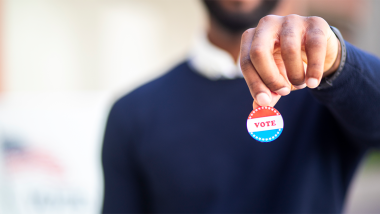The NYU Democracy Project
OUR RECENT EVENT!
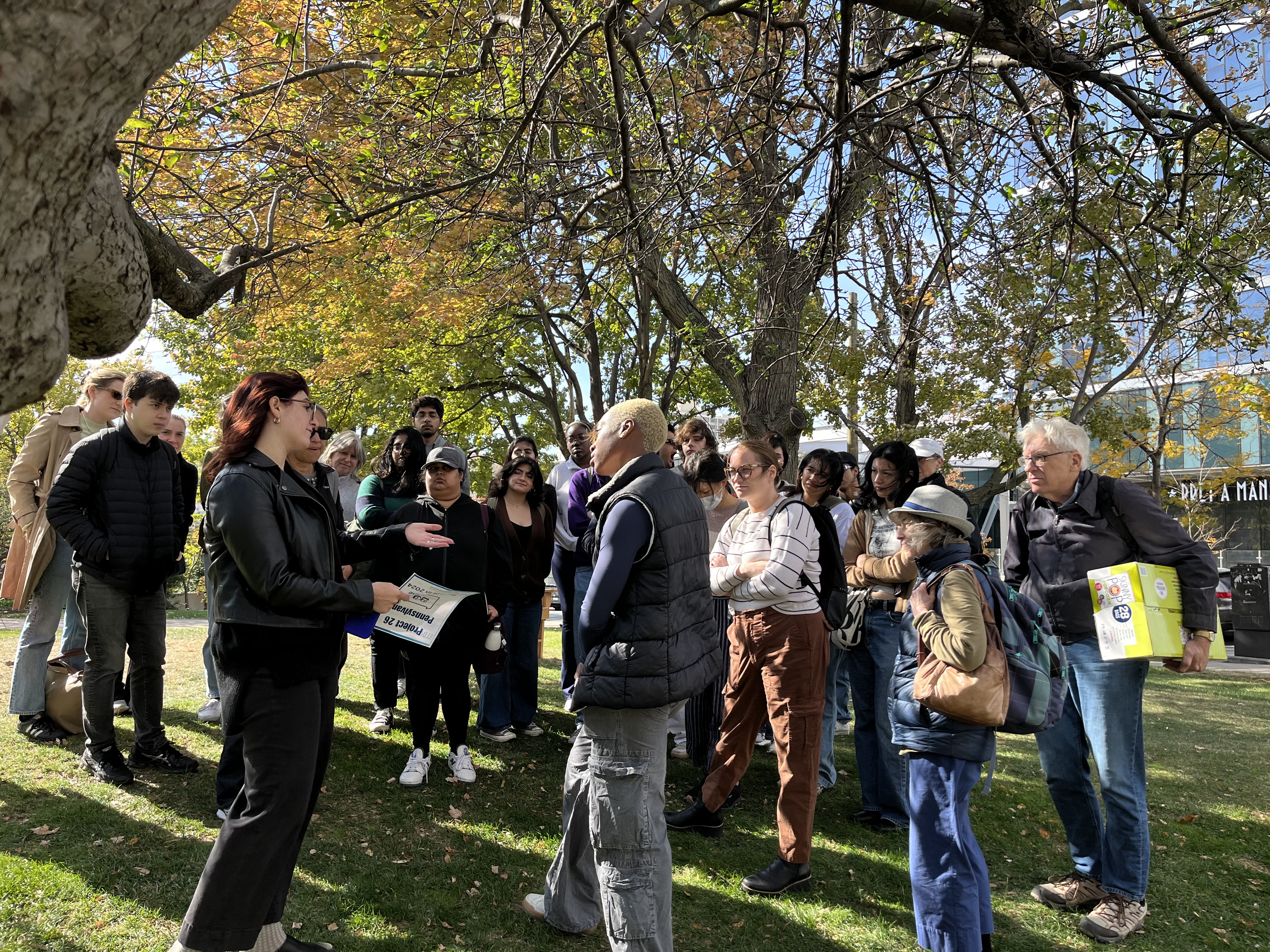
Students and faculty on a GOTV bus trip to Philly listen to instructions on how to canvass in November 2024.
About the NYU Democracy Project
The NYU Democracy Project began in 2019 with the VOTE2020 Initiative, a project aimed at increasing voter engagement in the 2020 election both on NYU's campus and nationwide. Since then, the Project has continued funding student fellowships to expand the reach of non-partisan organizations working to strengthen our democracy. The Project also serves to connect NYU students to volunteer opportunities, sponsor voter engagement events, and foster community-building and professional development.
The NYU Democracy Project is led by Wagner Faculty members Professor Erica Foldy and Professor John Gershman.
Check out our factsheet to learn more about program activities and engagement.
Fellowships
The NYU Democracy Project offers two funded fellowships: LEAD Fellowships (while in previous years these have been open to all NYU students, this year we have very limited funding, so the fellowships are only open to NYU Wagner students) and Parke Fellowships (only for continuing and graduating graduate-level NYU students).
Parke Fellowships
The Parke Fellowship at the Brennan Center for Justice, the pre-eminent voting rights think tank in the country, is a program open to NYU graduate students with quantitative and analytical skills who have an interest in voting rights and social justice.
Applications for the Summer 2026 Fellowship are now closed.
Questions? Email us at DemocracyProject@nyu.edu.
LEAD Fellowships
Only open to NYU Wagner students, the LEAD Fellowship helps connect students with non-partisan organizations dedicated to promoting voter access and democracy across the United States. LEAD Fellows receive a stipend of $10,000 to support their professional development and hands-on work with non-partisan groups. At a pivotal time for voting rights, the NYU Democracy Project's LEAD Fellowship empowers students to make a tangible impact and join the vital effort to ensure a democratic system that works for everyone. We expect the cohort to be substantially smaller than in previous years due to funding constraints.
The application for the Summer 2026 fellowship will open in late February. Keep your eye out for the application details.
For updates on the next application cycle, please subscribe to our mailing list.
Questions? Email us at DemocracyProject@nyu.edu.
Volunteering
Individual Volunteering:
- Check out this list of organizations that offer volunteer opportunities around voter engagement and education.
- For a more extensive list and to discuss opportunities further, email DemocracyProject@nyu.edu
Group Volunteering:
The NYU Democracy Project sponsors regular civic engagement work, like get-out-the-vote canvassing and letter-writing parties in partnership with non-partisan, grassroots organizations. Please subscribe to our mailing list for updates on future opportunities and events.
Democracy Cohort
The NYU Democracy Project Cohort comprises LEAD and Parke Fellows, recipients of the Ellen Schall Experience Fund, as well as other NYU students working or volunteering in pro-democracy organizations or campaigns. In addition to experience gained on the job, the Cohort features ongoing programming facilitated by NYU faculty to enrich what students learn in the field and promote professional development. Programming includes guest speakers, civic engagement opportunities, and facilitated group reflection and community-building.
Other fellowships opportunities:
- Ellen Schall Experience Fund (Wagner students only)
- Volunteer with HeadCount
- Changemaker Fellowships (NYU students only)
Already working in one of these capacities? Reach out to us at DemocracyProject@nyu.edu about joining the Democracy Cohort.
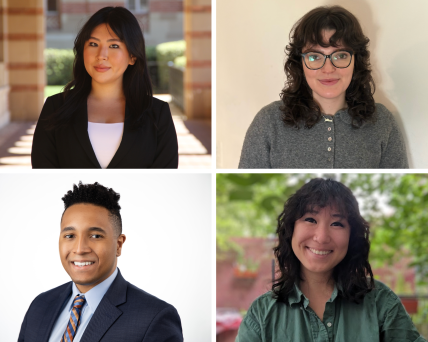
Meet the Fellows:
Read about current and past Democracy Fellows and what motivates their commitment to a more equitable and fair democracy.
Current Fellows
Previous Cohorts
- To sign up for our newsletter and receive updates on future fellowship application cycles, get-out-the-vote events, and democracy-related news, please subscribe to our mailing list here!
- Email Jenny Jamison, our Project Coordinator, at democracyproject@nyu.edu with any additional questions
PUBLISHED WORK BY FELLOWS
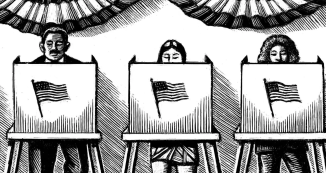
Voters Across the Country Amend Their Constitutions
“Voters in 41 states considered ballot measures in Tuesday’s election, most of which would amend their state constitutions, on issues including abortion, marijuana, and changes to their election procedures.”
While working at the Brennan Center, former Parke Fellow Zoe Merriman co-authored a report on state constitutional amendments.
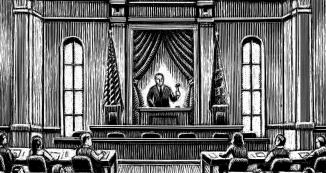
New Findings Highlight Lack of Diversity on State Supreme Courts
"For the past two years, 18 supreme courts have lacked even a single justice who identifies as a person of color, including in 12 states where people of color constitute at least 20 percent of the population."
While working at the Brennan Center, former Parke Fellow Zoe Merriman co-authored a report on the diversity of state courts.
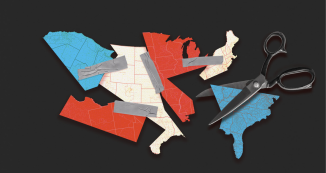
How Gerrymandering Tilts the 2024 Race for the House
"Gerrymandering has gone from an issue that barely registered with voters to one of the most salient. The unfairness of the maps that will be used in the 2024 elections shows why."
Parke Fellow Madison Buchholz co-authored a report with Peter Miller and others examining how gerrymandering advantages the Republican Party in the 2024 House race.
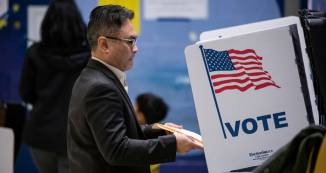
7 Facts About Voting — and Myths Being Spread About Them
"Our elections are secure and trustworthy, but rumors and lies on social media abound."
Parke Fellow Hanna Johnson co-authors blog post on analysis of social media posts containing false narratives around the election and voting.
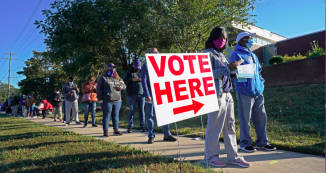
The Impact of Restrictive Voting Legislation
"Reports from across the nation reveal that new legislation will disproportionately suppress voters from marginalized groups."
Parke Fellows Zoe Merriman and Coryn Grange co-author a Brennan Center resource that explains the impact of new legislation on voter suppression.
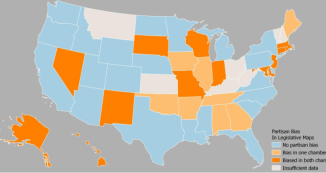
California knows how to avoid partisan gerrymandering
"In this article we explain that there is a solution to this once-a-decade nationwide battle: California’s model of an independent citizen redistricting commission."
Parke Fellow Anna Harris co-authors blog post on solutions to redistricting. Read above in SCOCAblog, a joint project of Berkeley Law's California Constituion Center and the Hastings Law Journal.
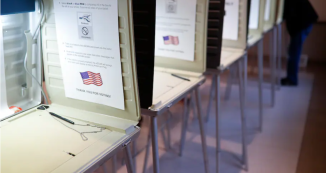
Sen. Manchin’s Freedom to Vote Act would help stop gerrymandering, our research finds
"We examined new district maps, and found that those drawn by independent commissions would be most likely to pass the Manchin test."
Parke Fellow Anna Harris co-authors op-ed for the Washington Post based on her research with the Brennan Center for Justice's Redistricting Program.
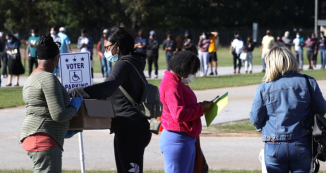
Large Racial Turnout Gap Persisted in 2020 Election
"70.9 percent of white voters cast ballots compared with only 58.4 percent of nonwhite voters — a disparity that will worsen with new restrictive voting laws."
Parke Fellow Coryn Grange co-authors Brennan Center analysis on research on racial disparities in voter turnout.
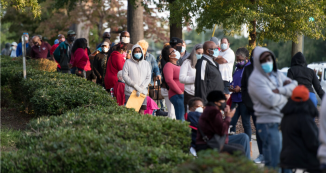
Racial Turnout Gap Grew in Jurisdictions Previously Covered by the Voting Rights Act
"Between 2012 and 2020, the white-Black turnout gap grew between 9.2 and 20.9 percentage points across five of the six states originally covered by Section 5 of the Voting Rights Act."
Parke Fellow Coryn Grange co-authors Brennan Center resource on analysis of racial disparities in voting and implications of changes to key voting legislation.
PROJECT MEDIA
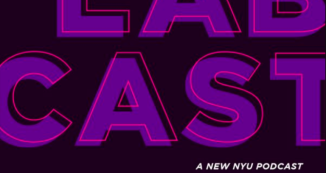
By the People for the People: the Vote 2020 Initiative
"As the consequential elections of 2020 approached, NYU professors Erica Foldy and John Gershman began asking these questions—and the VOTE 2020 Fellowship was their answer. 'By the People, For the People' tells the story of this experimental initiative, and examines what happens when everyday people, like Erica, John, and their students at NYU, take ownership of their democracy."
A student-made podcast tells the store of what inspired the VOTE2020 Initiative, and how it grew into the NYU Democracy Project.
